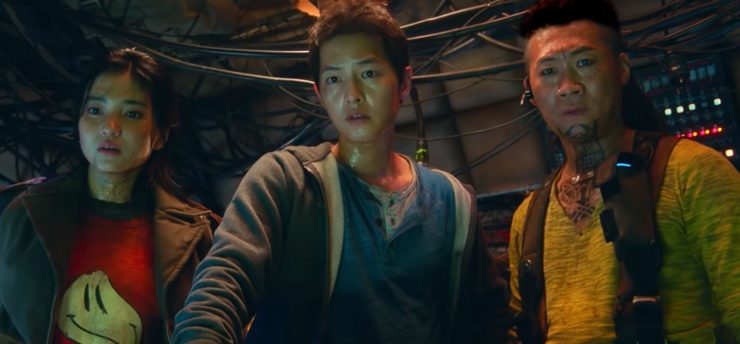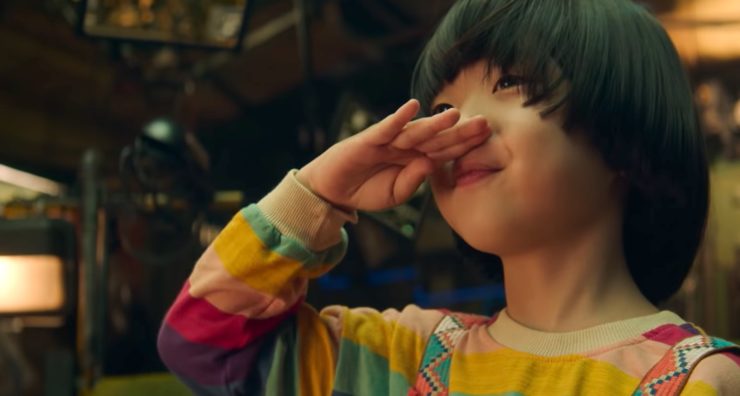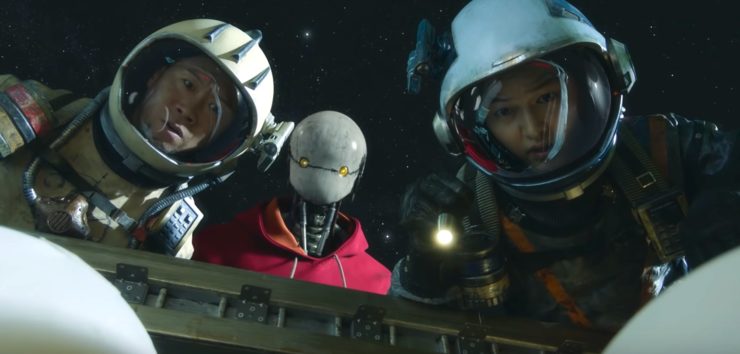There are a lot of science fiction films attempting to tackle questions of inequality and injustice while thrilling you with big budget space action, but most of them miss the mark. It’s not for lack of trying, certainly, and not for lack of ideas, but it’s difficult to render a problem down into an easily digestible two-hour thought experiment.
And then there are movies like Space Sweepers.
Minor spoilers ahead.
An idea brought forth by director Jo Sung-hee, Space Sweepers starts off as a film concerning itself with all the debris that humanity has launched into space and where it might all wind up years from now. It’s a fruitful premise that often sees many of us prickling with curiosity, so that would be enough—a future (set in 2092) where the Earth is dying, so ragtag crews who are not citizens of the corporation UTS must get visas to crew ships that drag off and salvage the space junk, making some quick cash to stay alive.
The crew of the Victory are one such set of misfits, captained by Jang (Kim Tae-ri), piloted by Tae-ho (Song Joong-ki), engineered out of trouble by Tiger (Jin Seon-kyu), and aided in all things by their robot companion Bubs (Yoo Have-jin). There’s not a lot of love between this group, and it’s hardly their fault—they’ve all got their own dreams, worries, and fears that they’re busy tending to in private. They’ve also got tortured pasts to brood about in silence. As these stories often go, things change when they hit upon a massive payday, a little girl android named Dorothy (Park Ye-rin) who is currently all over the news because she’s reportedly housing a hydrogen bomb in her chassis. The crew decide to trade her off to the number embedded in Dorothy’s phone in hopes of making a ton of money that can pay off their debts and get them where they need to go.
But that’s the least of their troubles. The chief antagonist of Space Sweepers is James Sullivan (played to odious, scheming perfection by Richard Armitage), the 150-year-old CEO of the UTS corporation who is busy prepping his “citizens” for a move to Mars. He’s determined that no one question his decision to make their new colony on a different planet, leaving the Earth behind and all its people to die. But more importantly, you know something’s amiss once he makes it clear that he believes humanity to be a dirty species, that they are in need of careful selection and some level of cleansing. It would seem that Sullivan has appointed himself god for a new era, determined to give his fellows a fresh start—on his exact terms, of course. (And if you don’t think it’s pointed that Sullivan is an entrepreneur using his knowledge and wealth to start a corporate colony on Mars when we’ve got our very own SpaceX to contend with, well…)
Because the true focal theme of Space Sweepers isn’t about orbiting junk or ragtag crews learning to get by and get along. It’s about systemic injustice, about poverty and desperation, and how we blame people for the choices that they make when they have nothing at all. Sullivan is the character best positioned to make this clear; twice in the film he presents someone with a choice, and twice he claims that selecting the morally “wrong” path is proof of a person’s irredeemable decay. He blames others for the lot he assigns them, for the safety and comfort he denies them, and then further debases their attempts to crawl their way into the light. Tae-ho ponders on this issue at the start of the film as he’s scavenging with his crewmates, wondering if they’re “bad” because they’re poor, but once this story plays out, the truth is plain: Poverty doesn’t make a person bad, it simply robs them of any good options, any just choices.

But we learn that the crew of the Victory is lovable nevertheless, and it’s all because of Dorothy (or Kot-nim, as we learn her nickname is). This goofy, farting little girl wins each of them over in short order, and we see the group for what they are—desperate and exhausted, but inescapably kind. More to the point, each of them has a history trying to escape or destroy the current regime that Sullivan has created, and they’ve each been punished for their refusal to participate in the system. There’s a lot more going on than what we see on the surface, and a lot that needs answering for. There are so many people being left behind.
Space Sweepers works because Jo Sung-hee, Yoon Seung-min, and Yoo-kang Seo-ae wrote a remarkably tight and packed script, full of sharp worldbuilding, jokes that come back, and long-game payoffs in the plot. The film is on the lengthier side at two hours and fifteen minutes, and they make every second of that run time work for them in its execution. Whether it’s high-octane action or moments of quiet despair, nothing is wasted and nothing is superfluous. It’s refreshing to see in a sci-fi action film, a genre that is often bloated with unnecessary fight sequences and winds up skimping on story for thrills.
Buy the Book


A Psalm for the Wild-Built
The movie is also remarkable for Bubs, who I have to spoil a bit in order discuss; Bubs is portrayed as a robot with “male” coding, cast using a male actor’s voice and given proportions that you would expect from a stereotypically big guy. But we quickly learn that Bubs is not male despite that coding—she’s been saving up her money to get a female “skin” for herself. This is something that Kot-nim sees and understands innately, calling her “lady” without ever being told, much to Bubs’ delight. The kid simply perceives it while the rest of Bubs’ shipmates presume “he” pronouns because she’s not yet comfortable telling them differently.
Now, this is a trans allegory rather than representation; there are no trans women among the cast that we can see. But as allegories go, Bubs’ story hews much closer to trans experience than average, and additionally, she’s wonderful. She has a pink sweater she wears during the final act, and she practices doing human makeup by putting far too much on Kot-nim’s tiny face, and her world-weariness slots into place the instant that you realize what she’s been hiding. More importantly, no one ever treats her poorly for being who she is, even once the truth is known. While we still need more trans representation throughout the world of film, this is a gold standard as far as allegory goes.
There’s not much more to be said without spoiling some of the bigger reveals, but this cast and the tropes they occupy are what really make the movie glimmer and glow. The film is masterful at subtly flipping conventions on their heads without making a big deal out of anything that it’s doing. Captain Jang is gruff and hard-drinking, but that doesn’t detract from her humanity and softness; Tae-ho is jaded and depressed, but it can’t dim the parts of him that are reaching for love from others; Tiger is a former gang leader who’s covered in tattoos, but he’s easily the squishiest of the bunch. Every single crew member of the Victory is complex and crushingly human. That the film makes space for those complexities alongside space battles and explosions is a marvel.

So many recent sci-fi films have attempted to tackle some or all of these themes and tropes with far limited success. Luc Besson’s Valerian and the City of the Thousand Planets, Neill Blomkamp’s Elysium, The Rise of the Skywalker, they all are attempting to point out the places where society is failing, and how we might fight our way out of the dark by standing up for one another. But they don’t succeed because there’s too much in their way on multiple fronts, be it legacy, or over-simplification, or casting missteps. They can’t do what they set out to do.
Space Sweepers is here to fill that void, making it one of the better sci-fi blockbusters I’ve seen in the entirely of the 21st century so far. It’s joyful without being trite, humorous without being cruel, fun without being vacuous. Watch it, enjoy it, and recapture a little hope by the time it’s over.
Space Sweepers is available to watch on Netflix US.
Emmet Asher-Perrin would dearly appreciate it if you took some time tonight and watched this movie as soon as possible? You can bug them on Twitter, and read more of their work here and elsewhere.










